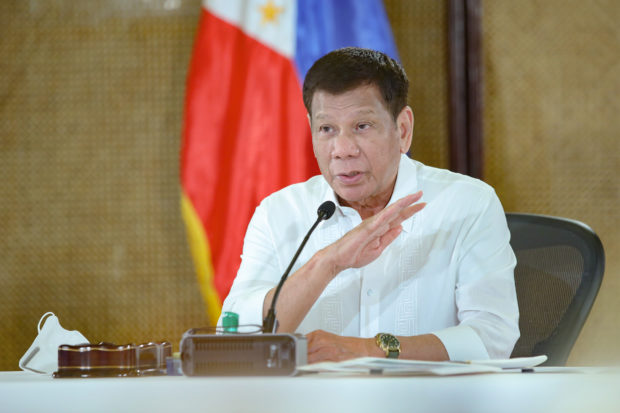Duterte economic team to discuss possible relief amid high oil prices

President Rodrigo Duterte during his Talk to the People. Image from PCOO / Facebook
MANILA, Philippines — President Rodrigo Duterte’s economic managers will meet on Monday to take a closer look at the local impact of the Ukraine-Russia war, especially on food and oil prices.
National Economic and Development Authority Undersecretary Rosemarie Edillon told Saturday’s Laging Handa briefing that Neda, the Department of Finance (DOF) and the Bangko Sentral ng Pilipinas (BSP) will discuss their estimates on oil inflation so far this month to come up with immediate, short-term relief to vulnerable sectors as well as medium- and long-term solutions to rising prices.
Edillon noted that while inflation was steady in February — at 3 percent year-on-year or similar to the January rate, expensive already impacted on households’ electricity, gas and other fuels whose price hikes climbed 12.8 percent compared to a year ago levels, as well as private transport costs which jumped 29.8 percent last month. But Edillon noted that slower food price inflation offset the fast increase in oil prices last month.
The Neda official said demand for gasoline, fuels and oil-based commodities needed to be managed. She added that high oil prices would likely spill over to electricity costs.
Edillon said further reopening more productive economic sectors to generate jobs by moving the entire country to the lowest alert level 1 restrictions would cushion spillover effects of the Ukraine-Russia war on the domestic economy.
Article continues after this advertisementAlbert Park, chief economist of the Manila-based multilateral lender Asian Development Bank (ADB), said in a tweet on Saturday that “the biggest impact of Russia-Ukraine war on Asian economies will be higher oil and gas prices, which will fuel inflation and slow growth in energy-importing countries, but help net exporters.” The ADB’s host-country the Philippines is a net oil importer.
Article continues after this advertisement“The Russia-Ukraine war will increase food prices. Russia and Ukraine supply 22 percent and 18 percent of global wheat and barley exports, respectively; Ukraine supplies 15 percent and 12 percent of global rapeseed and corn exports, respectively; and Russia supplies 12 percent of global fertilizer exports,” Park added.
But in terms of foreign trade and investments, Park said most of Asia would have limited exposure to the conflict, save for their neighboring countries in the Central Asia and Caucasus regions, including Mongolia.
“Russia and Ukraine account for only 2.5 percent of Asia’s imports and 1.5 percent of Asia’s exports. Developing Asia also accounts for only 5 percent of FDI in Russia,” Park said, referring to brick-and-mortar foreign direct investment that generates jobs.
Data compiled by London-based think tank Capital Economics showed that in the case of the Philippines, its exports to Russia in 2020 was negligible or almost zero as a share to gross domestic product (GDP). Imports from Russia and Ukraine, meanwhile, accounted for 0.2 percent and nearly zero of 2020, respectively, Capital Economics said, citing International Monetary Fund (IMF) and World Bank data.
Capital Economics data showed that the stock of Russian FDI in the Philippines and Philippine FDI in Russia were both nearly zero as a percentage of GDP two years ago. Two-way foreign portfolio investments or “hot money” were also very small — Russian portfolio investment in the Philippines at only 0.01 percent, and Philippine investment in Russia almost zero as a percent of GDP in 2020. Portfolio investments are considered short-term bets — hence the nickname hot money — because these placements may be pulled out quickly during times of market turbulence, like the Ukraine-Russia war.
Edillon said that among the effects of the Ukraine-Russia war was a depreciation of the Philippine peso. But she said we need not worry because the economy has big international reserves or stash of US dollars.
In a March 3 report, Dutch financial giant ING said that the sustained huge trade-in-goods deficit resulting from higher imports partly due more expensive oil importation costs than exports would weaken the peso.
“We expect recent trends for Philippine trade to hold, with imports sustaining strong double-digit gains as the economy continues to gradually reopen. Elevated crude oil prices should also bloat the energy import bill, keeping the trade gap wider than $4 billion,” ING said.
“Exports, on the other hand, will post a decent gain on robust electronic component exports but will not likely keep up with the pace of expansion for inbound shipments. In the coming months, the trade gap should remain wide, suggesting a sustained depreciation bias for the peso,” ING added.
The ballooning trade deficit since last year was a big contributor to the current account deficit in the Philippines’ balance of payments (BOP), as economic recovery meant the country had to spend more dollars to cover imports of raw materials and finished goods — unlike in 2020 when a slump in consumer spending accumulated foreign reserves. The current account deficit weakens the peso.
In particular, ING estimated the Philippines’ goods imports in January to have grown by 31.5 percent year-on-year, while exports likely grew 14.1 percent, resulting in a $4.75-billion trade deficit.
The Philippine Statistics Authority’s (PSA) preliminary report on January international merchandise trade will be out on Friday, March 11.
In a March 4 report, Capital Economics forecasted the Philippines’ imports to have climbed by 25 percent year-on-year in January, while exports likely increased by a slower 17.5 percent.
HSBC Global Research projected in a separate March 4 report 32.6-percent Philippine imports growth outpacing a 4.2-percent rise in exports at the start of the year, which would result in a wider trade deficit amounting to $5.39 billion in January from $5.21 billion last December.